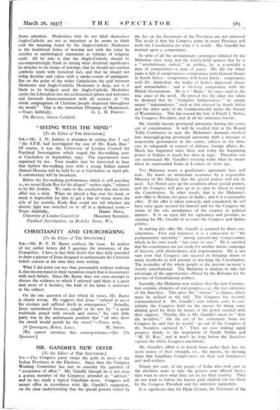MR. GANDHI'S NEW OFFER
[To the Editor of THE SPECTATOR.] SIR.—The Congress party swept the polls in most of the Indian Provinces at the Elections. Since then the Congress Working Committee has met to consider the question of " acceptance of office." Mr. Gandhi (though he is not even a 4-anna member of the Congress) attended as " adviser," and he has made a typical Gandhian move. Congress will accept office in accordance with Mr. Gandhi's suggestion, on the clear understanding that the special powers vested by the Act on the. Governors of the Provinces are not enforced. The result is that the Congress party in every Province will work the Constitution for what it is worth. Mr. Gandhi has insisted upon a compromise.
In spite of all the revolutionary campaigns initiated by the Mahatma since 1919, and the widely-held opinion that he is a " revolutionary radical " in politics, he is essentially a man of compromise—a man of peace. His life for thirty years is full of compromises—compromise with General Smuts in South Africa : compromise with Lord Irwin : compromise with Dr. Ambedkar, the leader of India's depressed classes and untouchables : and a life-long compromise with the British Government. He is a " Bania " by caste—and in the true sense of the word. He proved this the other day when he declared that by " Complete Independence " he simply meant " independence " such as that enjoyed by South Africa and the other units of the Commonwealth under the Statute of Westminster. This has roused the fury of Pandit J. Nehru, the Congress President, and of all his extremist friends.
Mr. Gandhi favours provincial autonomy, leaving the centre out of consideration. It will be recalled that at the Round Table Conference in 1931 the Mahatma's demands resolved into thorough-going provincial autonomy with a measure of responsible government in the centre, subject in the latter case to safeguards in respect of defence, foreign affairs, &c. Much has happened since then, and today the bargaining power of Indians is much less than in 193r. Therefore one can understand Mr. Gandhi's reviving today what he meant when he represented India in London six years ago.
The Mahatma wants a gentleman's agreement here and now. He wants an immediate assurance by a responsible Minister of His Majesty that the special powers will not be used. Let Britain give up the condition about sr ecial powers, and the Congress will give up in its turn its threat to wreck the Constitution. In other words, that is the Mahatma's new offer to Britain, for peace in India ; and it is a reasonable offer. If the offer is taken seriously, and considered, he will have once again secured for himself and for the Congress the status of the sole mouthpiece of the country in political matters. It is an open bid for supremacy and provides an opening for Mr. Gandhi to re-enter the Congress and Indian politics.
In making this offer Mr. Gandhi is actuated by three con- siderations. First and foremost, it is a concession to " the parliamentary mentality " among present-day Congressmen, which in his own words " has come to stay." He is satisfied that his countrymen are not ready for another drastic campaign of boycott, civil disobedience and imprisonment. He is not sure even that Congress can succeed in bringing about so many deadlocks as will amount to wrecking the Constitution. The mentality of the whole people at the present mcment is strictly constitutional. The Mahatma is anxious to take full advantage of the opportunities offered by the Reforms for the practice of Constitutional politics.
Secondly, the Mahatma now realises that the new Constitu- tion contains elements of real progress, e.g., the vast extension of the franchise. This gives the " masses " a chance, which must be utilised to the full. The Congress has recently commandeered it. Mr. Gandhi's new scheme seeks to con- solidate the Congress hold on the masses by doing some abiding good for them by means of the power secured with their support. Thirdly, this is Mr. Gandhi's move to " dish the Socialists." On the eve of his retirement from the Congress he said that he would go out of the Congress if the Socialists captured it." They are now making rapid progress thanks to the inspiration of Pandit Nehru and " M. N. Roy," and it won't be long before the Socialists capture the whole Congress machinery.
Mr. Gandhi's effort is to knock from under their feet the main source of their strength, viz., the masses, by showing them that Gandhian Congressmen are their real benefactors and well-wishers.
Ninety per cent. of the people of India who took part in the elections want to take the powers now offered them ; they want to show what they can do for their country. They do not want to follow the barren path chalked out for them by the Congress President and his extremist supporters.
It is significant that Sir Hyde Gowan, the Governor of the Central Provinces, laid his finger the other day on the keynote of Provincial Autonomy under the new Reforms. He said in the course of an important speech : " The special powers of the Governor would only be used in the case of grave necessity," and he added : " Future Ministers will find that in very truth they will be called upon to shoulder the whole burden of responsibility for the people's welfare." That is the clear intention of Parliament. am, Sir, yours, &c.,











































 Previous page
Previous page